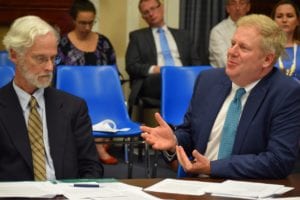Who is a member?
Our members are the local governments of Massachusetts and their elected and appointed leadership.

At the June 11 meeting of the Local Government Advisory Commission with the administration, Sandwich Town Manager Bud Dunham asks that any fiscal 2019 state surplus be prioritized for the Chapter 90 local road and bridge program and to fully fund charter school mitigation payments and other underfunded local accounts.
Through mid-July the House and Senate had not yet reached agreement on a fiscal 2020 state spending plan to send to Gov. Charlie Baker.
Legislative leaders at the time were saying that negotiations could stretch into the fourth week of the month, making the budget delay the longest since 2001.
The House and Senate each passed separate versions of a fiscal 2020 budget much earlier, both totaling about $43 billion, and named three members each to a six-person conference committee on May 30 to iron out differences. Legislative conference committees generally do not comment on negotiations, and there have been no announcements on what may be holding up a final budget bill this year.
Since the fiscal year began on July 1, state operations and scheduled payments, including municipal and school aid, have been funded by a $5 billion interim spending bill signed by Gov. Charlie Baker in late June.
While local aid payments have been made on time based on funding levels in the governor’s budget recommendation filed in January, municipalities and school districts are still waiting for the final word on amounts for Chapter 70 school aid and required local contributions, charter school mitigation payments, and other municipal and school aid accounts where the House and Senate approved different amounts or different policies. How these differences are resolved will have a significant impact on many local budgets and services, particularly schools, which are preparing to open for the year.
House and Senate negotiators need to reconcile significantly different approaches to updating school spending standards in Chapter 70 school finance law and in the different appropriation levels attached to them. Another big difference is how charter school mitigation payments are calculated and funded.
The House and Senate both voted to fund the main municipal aid account (Unrestricted General Government Aid) at $1.129 billion, the same amount recommended by the governor. The stability in the UGGA number throughout the budget process has helped cities and towns minimize revenue uncertainty and finalize local spending plans on time.
While the focus has been on the fiscal 2020 budget, there is still work to be done to close out fiscal 2019, which ended with a surplus of tax and State Lottery proceeds over initial projections for the year.
Last year, the governor filed a final fiscal 2018 supplemental budget on July 13 that included one-time capital funds for local government and recommendations to increase funding for under-funded aid accounts. The Legislature approved the close-out bill in October.
The MMA has been calling for a fiscal 2019 close-out bill that would provide additional funding for local road and water projects and cover shortfalls in the charter school mitigation and other aid accounts.